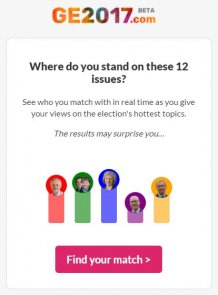
ge2017.com has reached more than 800,000 voters
Online election advice website built by former student reaches 800,000+ voters
A website, ge2017.com, set-up by Exeter alumnus Matt Morley (History, 2015) has reached more than 800,000 voters in the run up to this year's General Election. The site asks a simple list of questions which are based on policy ideas and then matches the user's response to those of the parties. It also shows users who their local candidates are based on their postcode.
Matt says that whilst this isn’t new, there are certain ‘leapfrog’ improvements this year that have gone above and beyond what users expect including; tactical voting that tells you what your practical options are in that area, ‘nuance’ answers that better match their views to parties rather than a ‘binary’ choice as well as the 'Explaain' card that layers additional content on the page so the reader doesn’t have to leave the site.
He adds: "I snapped up the ge2017.com domain name 7 minutes after the election was called. I knew that this year, because of the snap nature of the election, that people would be searching more than ever and ‘GE2017’ would be a major search term.’ The bet paid off and the team dropped everything to focus on the election."
The site has enjoyed more than 800,000 completions with the typical user spending 7 ½ minutes on site with a 95.8% completion rate. The team, lead by the co-founders of technology startup Explaain, have also enjoyed viral success with the launch of their student site ge2017.com/students which allowed students to see where their vote had more impact, at home or uni. It was used over 200,000 times in its own right and even convinced certain voters to switch who they voted for and where they voted.
The site has been featured by news outlets including the BBC, Independent, Guardian, Huffington and Metro. Morley also featured on prime time BBC TV as part of the Victoria Derbyshire show.
GE2017.com is also a lead partner in ‘Turn Up’, a non partisan voter registration drive aimed at younger voters that includes Facebook, Twitter, Uber and Snapchat. Collectively they are thought to be responsible for encouraging over 1 million people to register to vote.
Date: 5 June 2017
